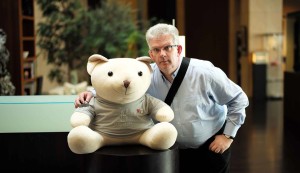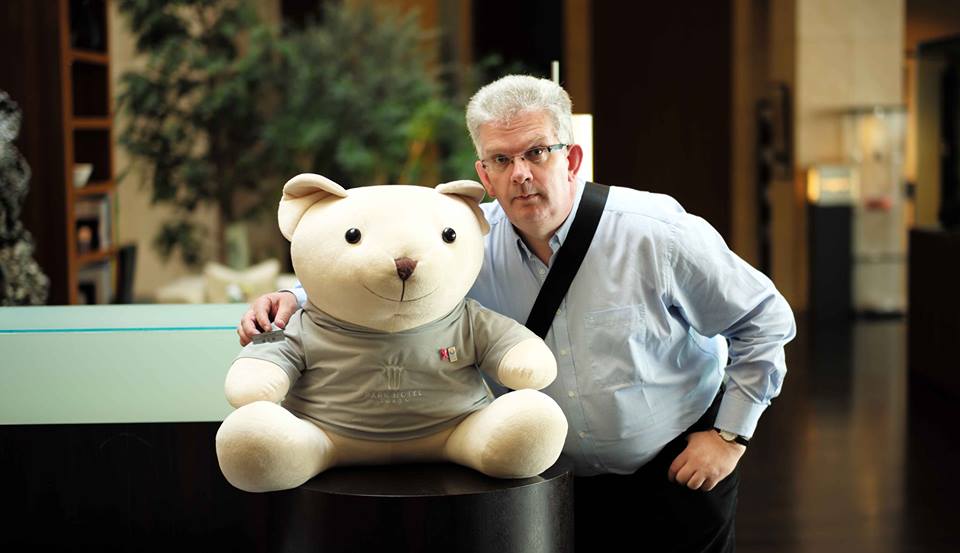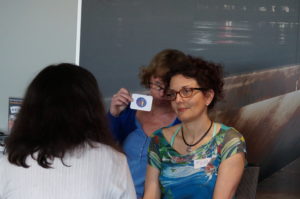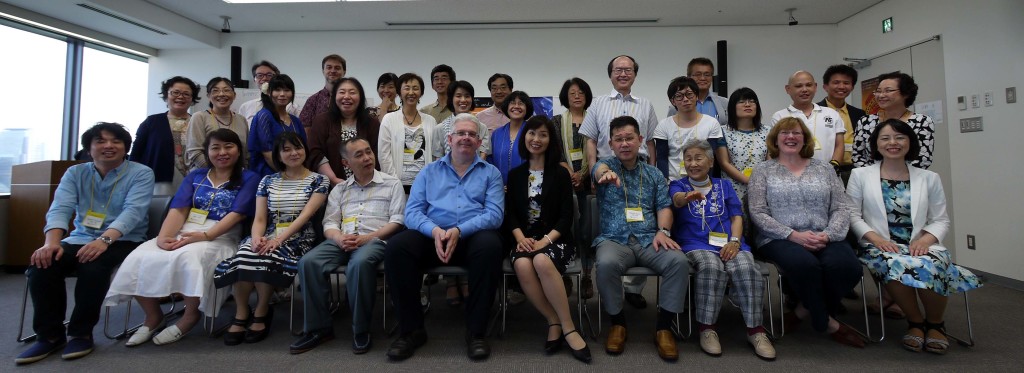I first came across NLP in the 1990s and was amazed by the possibility of using the core NLP skills in business, coaching and therapy. I was so impressed that I taught certificated NLP trainings for many years before developing the Provocative Change Works model. NLP has been extremely helpful in decoding Frank Farrelly’s Provocative Therapy which then evolved into PCW. This article aims to highlight what I think is great about NLP as well as a lot of what I think is problematic and to be blunt fairly bonkers about the field. For those with an evangelical view of NLP and who consider any objective criticism as “bashing NLP”, I respectfully point out the following. Firstly, NLP is “NOT a thing that can be hit” and secondly the behaviour of trainers and NLP practitioners is NOT the same as the actual NLP tool kit. This is more than often completely missed by many students developing “linguistic awareness”
First the good news!
There are some really excellent NLP trainers doing great work across the planet. These include Steve and Connirae Andreas, Richard Gray, Richard Bolstad among many others. In almost every instance these individuals have created original work using the NLP tool kit. NLP as we all know was created by modelling some of the very best therapists and communicators and Bandler and Grinder did a good job in creating a teachable set of skills that became NLP. In recent times many smart NLP folks have begun to appreciate that the old “lets fight” behaviour does little to promote NLP as credible to the wider world and is a monumental waste of time for all concerned. The NLP Research and Recognition Project is groundbreaking as an initiative in getting NLP to be taken seriously. Both Frank Bourke and Richard Gray deserve massive recognition for this initiative. The “Innovations in NLP” book edited by Michael Hall and Shelle Rose Chavet was also unique in bringing together many smart NLP minds and was a first for the written word in acting as a catalyst for NLP trainers and practitioners to begin to share new insights.
Of course no book or research is perfect, but I can’t help but notice that the “co-creators” were absent from both these initiatives. ANLP of course continues to promote cooperation in NLP, with a vision beyond simply selling products and bums on seats on courses. Many forward thinking trainers in NLP appreciate that after four decades the market and interest for NLP has changed. New technology means that the public have greater expectations in terms of audio and video quality, so the days of poorly recorded unedited seminars are in my view well and truly over! Social media has also proved to be a game changer and the terrible NLP forums of days gone by which were mostly platforms for self-promotion are now thankfully also in the past. These days I am fortunate to see some really excellent NLP training schools from around the world. I have witnessed a really high standard of NLP awareness in Japan, USA, Europe and in the UK. In all such instances, the training was comprehensive, the group sizes sensible and there was proper and appropriate student evaluation involved in the learning process.
Ok, now for “other news” and the plain crazy…
I have close to two decades of being involved in NLP and I continue to be mystified at why there’s so much incongruity in a field that claims to be the pursuit of excellence. There are many problems that have been ducked, mostly in favour of commercial considerations. Some NLP courses have been greatly reduced in size, while prices have skyrocketed. This means that live trainings are often beyond the reach of many students, who turn to some seriously daft accelerated online trainings instead. I have no problem with online platforms but once again many trainers over promise to a quite ludicrous and unhelpful extent.
Some NLP trainers continue to advocate “unconscious installation” as the primary method for NLP learning. This is a wonderful catch all concept that has from what I see little grounding in reality. My question would be “When does this supposedly unconscious installation become conscious, useful integrated learning?” For those of us with kids I wonder how we would react to our sons and daughters attending a class of hundreds of pupils and were informed that all learnings would be “unconsciously installed” with little or no sign of any conscious leaning that could be integrated into daily life?
I was somewhat surprised when one “Master Trainer” about to present to a class of 400 NLP practitioner students asked the assistants close by “Remind me what exactly is a presupposition?” In recent years there seems a trend towards online certifications and ever shorter courses. This in my view poses numerous problems as regardless of the skill of those presenting the training, attendees have very little fly time to integrate the skills. On some courses the attendees are not even able to ask the trainers a single question and instead are directed to the assistants who help out on a voluntary basis. Of course there’s nothing wrong with this but let’s not confuse entertainment with real education and learning…
My observations are that the wider public are often very confused as to what NLP actually is, not helped when the two co-creators can’t agree themselves. Many “NLP Schools” are set up primarily as commercial concerns each seeking customers from the exact same potential pool. Again nothing wrong with commercial business aspirations, but often emphasis on primarily making money means that the quality of the training is greatly sacrificed. The ever more grandiose claims made about what NLP can do frankly can be a massive turn off for any potential student interested in learning about the field.
There seems to be an ongoing preoccupation with status in some NLP training schools. A private client who had no awareness of NLP asked how a person with zero therapeutic experience could become “an advanced therapeutic specialist” in just a few days. Terms like “Master Trainer” can mean just about anything, when some schools “bestow” this title like a form of medieval patronage.
There is in my view a real danger that NLP is viewed as being “a grandfalloon”
“A granfalloon, in the fictional religion of Bokononism (created by Kurt Vonnegut in his 1963 novel Cat’s Cradle), is defined as a “false karass”. That is, it is a group of people who affect a shared identity or purpose, but whose mutual association is actually meaningless”
Too harsh a comment? Maybe, BUT my own experience is that for all the supposed “pursuit of excellence” often basic common sense gets left at the door in many NLP circles and societies. If NLP is truly about modelling and “the meaning of communication is the response you get”, then it’s mystifying that so many websites are not even Google mobile friendly. Once again basic common sense is not that commonplace.
Ascendance to the cosmic realms?
In recent years I have noticed an ongoing trend of past NLP trainers reinventing themselves as “shaman” and “gurus” I am unsure if this is a natural progression beyond the traditional certification process, and wonder if “There is more to heaven and earth than dreamed of in NLP seminar manuals?”
As someone who studied some of these esoteric practices for over twenty years, some of what I see is to be frank quite laughable. It’s another example of attempted reinvention to sell more courses and products to mostly the exact same group of people. Of course this lazy type of marketing occurs in other fields and I have had cause to groan at the dreadful attempts to hijack Frank Farrelly’s work with similarly dumbed down results, by bolting on the term “Provocative” to all manner of ill-conceived nonsense.
A golden rule for individuals aspiring to imagined guru status is to “SPEAK VERY SLOWLY IN AN AFFECTED MANNER,” spouting all kinds of vague proclamations that on closer analysis are unsurprisingly totally meaningless. If you are desirous of such transcendence, check out “How to be Ultra Spiritual with JP Sears” Everything you need is wonderfully detailed in this video.
Let’s end on a positive note
I genuinely have a love for the core elements of NLP and am grateful for all the training I have had since 1990s. I also have a massive amount of frustration that a field which shows so much promise has managed to spectacularly avoid basic common sense in presently itself in a more credible and professional manner. I do hold out some hope that there are enough smart individuals in the field who care about the quality of what is being taught to ensure NLP is not termed as “pseudoscience” as suggested in Wikipedia. I am fortunate to have interviewed a number of people who were around at the very start of the field and even some that knew one of the co-creators prior to formulating what became known as “NLP.”
The best hope for the future of NLP lies in cooperation between those who have a genuine care in teaching NLP in an ethical and caring manner. To quote a well-known Japanese proverb especially favoured by Steve Andreas
“No one of us is smarter than ALL of us”
Nick Kemp
Creator of Provocative Change Works, Blogger and Author



 I get approached by all kinds of individuals wanting to promote my events. Enthusiasm is always welcome, but it needs to be matched by good business and communication skills. When I ran NLP trainings over a decade ago I was amazed at some of delusional thinking from some fellow NLP trainers in the UK. Most had not had a background in business and could be quite delusional in their thinking.
I get approached by all kinds of individuals wanting to promote my events. Enthusiasm is always welcome, but it needs to be matched by good business and communication skills. When I ran NLP trainings over a decade ago I was amazed at some of delusional thinking from some fellow NLP trainers in the UK. Most had not had a background in business and could be quite delusional in their thinking. In any business transaction proper definitions of expectations are essential for a successful outcome. Any professional trainer appreciates that there’s a great deal of time involved in preparing training materials for the proposed event. Trainers who are presenting their own unique material have often spent years working on content and figuring out how best to sequence this in a live training. This is with respect very different to presenting stock NLP or hypnosis courses where there is a well-thumbed existing template.
In any business transaction proper definitions of expectations are essential for a successful outcome. Any professional trainer appreciates that there’s a great deal of time involved in preparing training materials for the proposed event. Trainers who are presenting their own unique material have often spent years working on content and figuring out how best to sequence this in a live training. This is with respect very different to presenting stock NLP or hypnosis courses where there is a well-thumbed existing template. Even if promoters tick box number one, many crash and burn when it comes to this aspect. There is nothing more frustrating as a trainer than trying to get key information from a promoter and either being fobbed off with excuses or even worse have requests ignored. The most successful trainers and presenters can literally pick and choose where they want to train and some time is at a premium. Sometimes I am approached by a promoter with a request to do a significant amount of training. I always decline such ambitious requests until they have at some level proved they can deliver a professional event and crucially do so in a stress free manner. One of my big frustrations is to ring fence blocks of time in the calendar for a specific host, not hear anything and then have them want to cancel or shift dates. This can lead to “dead time” which with notice could have been used more productively. Yes, when dealing with people things don’t always go to plan, BUT good communication is essential at all times.
Even if promoters tick box number one, many crash and burn when it comes to this aspect. There is nothing more frustrating as a trainer than trying to get key information from a promoter and either being fobbed off with excuses or even worse have requests ignored. The most successful trainers and presenters can literally pick and choose where they want to train and some time is at a premium. Sometimes I am approached by a promoter with a request to do a significant amount of training. I always decline such ambitious requests until they have at some level proved they can deliver a professional event and crucially do so in a stress free manner. One of my big frustrations is to ring fence blocks of time in the calendar for a specific host, not hear anything and then have them want to cancel or shift dates. This can lead to “dead time” which with notice could have been used more productively. Yes, when dealing with people things don’t always go to plan, BUT good communication is essential at all times. Every relationship is a trade. Yes, there is a financial trade in terms of a fee and expenses, but the trade goes beyond that. The whole trade includes all the above factors I have mentioned. Things don’t always go to plan, but the best promoters are an absolute joy to work with and everyone involved benefits from the association. When I choose promoters there is always a trial period to assess the working relationship. I fully appreciate that not everything always goes to plan straight away and that’s fine. However, with sensible co-operation in most cases we achieve excellent results. The best promoters are great strategic thinkers, personable and well-grounded in the realities of business. I applaud such individuals as without them my own PCW trainings would never have reached such a global audience.
Every relationship is a trade. Yes, there is a financial trade in terms of a fee and expenses, but the trade goes beyond that. The whole trade includes all the above factors I have mentioned. Things don’t always go to plan, but the best promoters are an absolute joy to work with and everyone involved benefits from the association. When I choose promoters there is always a trial period to assess the working relationship. I fully appreciate that not everything always goes to plan straight away and that’s fine. However, with sensible co-operation in most cases we achieve excellent results. The best promoters are great strategic thinkers, personable and well-grounded in the realities of business. I applaud such individuals as without them my own PCW trainings would never have reached such a global audience.
 I just returned from two weeks in Japan and once again was reminded by the wonders of Japanese design
I just returned from two weeks in Japan and once again was reminded by the wonders of Japanese design